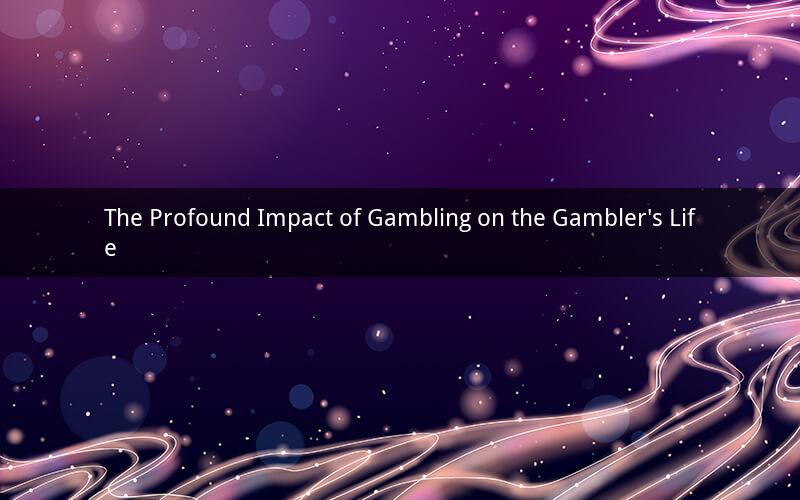
Gambling, an activity that has been around for centuries, continues to captivate individuals from all walks of life. While some may view it as a harmless form of entertainment, the truth is that gambling can have a profound impact on the life of the gambler. This article delves into the various aspects of how gambling affects the gambler's life, including emotional, financial, and social repercussions.
Emotional Impact
One of the most significant impacts of gambling on a gambler's life is the emotional turmoil it can cause. The thrill of the game and the potential for winning can lead to intense feelings of excitement and euphoria. However, when things don't go as planned, the emotional consequences can be devastating.
1. Anxiety and Depression: Gamblers often experience heightened levels of anxiety and depression, especially when they are on a losing streak. The constant worry about losing money and the fear of not being able to stop can lead to severe emotional distress.
2. Guilt and Shame: Many gamblers feel guilty and ashamed of their addiction, which can lead to feelings of isolation and low self-esteem. They may also feel ashamed of their actions, causing them to hide their addiction from friends and family.
3. Relationship Strain: The emotional impact of gambling can also strain relationships with loved ones. Gamblers may become distant, irritable, and even abusive, leading to conflicts and breakdowns in communication.
Financial Impact
The financial impact of gambling can be equally devastating, as it often leads to significant financial losses. The allure of winning big can make gamblers ignore the potential consequences of their actions, leading to severe financial hardship.
1. Debt: One of the most common financial consequences of gambling is debt. Gamblers may borrow money to fund their addiction, leading to a cycle of debt that can be difficult to break.
2. Loss of Income: Many gamblers prioritize gambling over their jobs, leading to a loss of income. This can further exacerbate financial difficulties and make it harder to pay off debts.
3. Bankruptcy: In extreme cases, gambling can lead to bankruptcy, as gamblers exhaust all their resources in an attempt to win back their losses.
Social Impact
Gambling can also have a significant impact on the gambler's social life, as it can lead to isolation and strained relationships with friends and family.
1. Isolation: Gamblers may become isolated due to their addiction, as they may avoid social situations or withdraw from their relationships.
2. Family Strain: The emotional and financial impact of gambling can strain relationships with family members, leading to conflicts and even estrangement.
3. Loss of Friends: Gamblers may lose friends due to their addiction, as their behavior becomes increasingly erratic and unpredictable.
Preventing and Treating Gambling Addiction
Recognizing the signs of gambling addiction is the first step towards addressing the issue. If you or someone you know is struggling with a gambling addiction, here are some resources and strategies to help:
1. Seek Professional Help: A therapist or counselor can provide guidance and support to help you overcome your addiction.
2. Support Groups: Joining a support group can provide you with a sense of community and understanding from others who have experienced similar struggles.
3. Set Realistic Goals: Set achievable goals to help you manage your gambling behavior and regain control of your life.
4. Create a Support System: Surround yourself with friends and family who are supportive and understanding of your situation.
5. Educate Yourself: Learn about the risks and consequences of gambling to help you make informed decisions and avoid future addiction.
In conclusion, gambling can have a profound impact on the life of the gambler, affecting their emotional, financial, and social well-being. Recognizing the signs of addiction and seeking help are crucial steps towards overcoming this challenging issue.
Questions and Answers:
1. Q: Can gambling addiction be cured?
A: Yes, gambling addiction can be treated and managed with the right support and resources.
2. Q: How can I tell if someone is struggling with a gambling addiction?
A: Look for signs such as secretive behavior, financial difficulties, and changes in relationships.
3. Q: Are there any legal consequences of gambling addiction?
A: While gambling addiction itself is not illegal, the illegal activities that may accompany it, such as fraud or theft, can lead to legal consequences.
4. Q: Can a person recover from gambling addiction on their own?
A: While some individuals may be able to recover on their own, seeking professional help and joining support groups can significantly improve the chances of successful recovery.
5. Q: How can I support a loved one who is struggling with a gambling addiction?
A: Offer your support, encourage them to seek professional help, and be patient throughout their recovery journey.